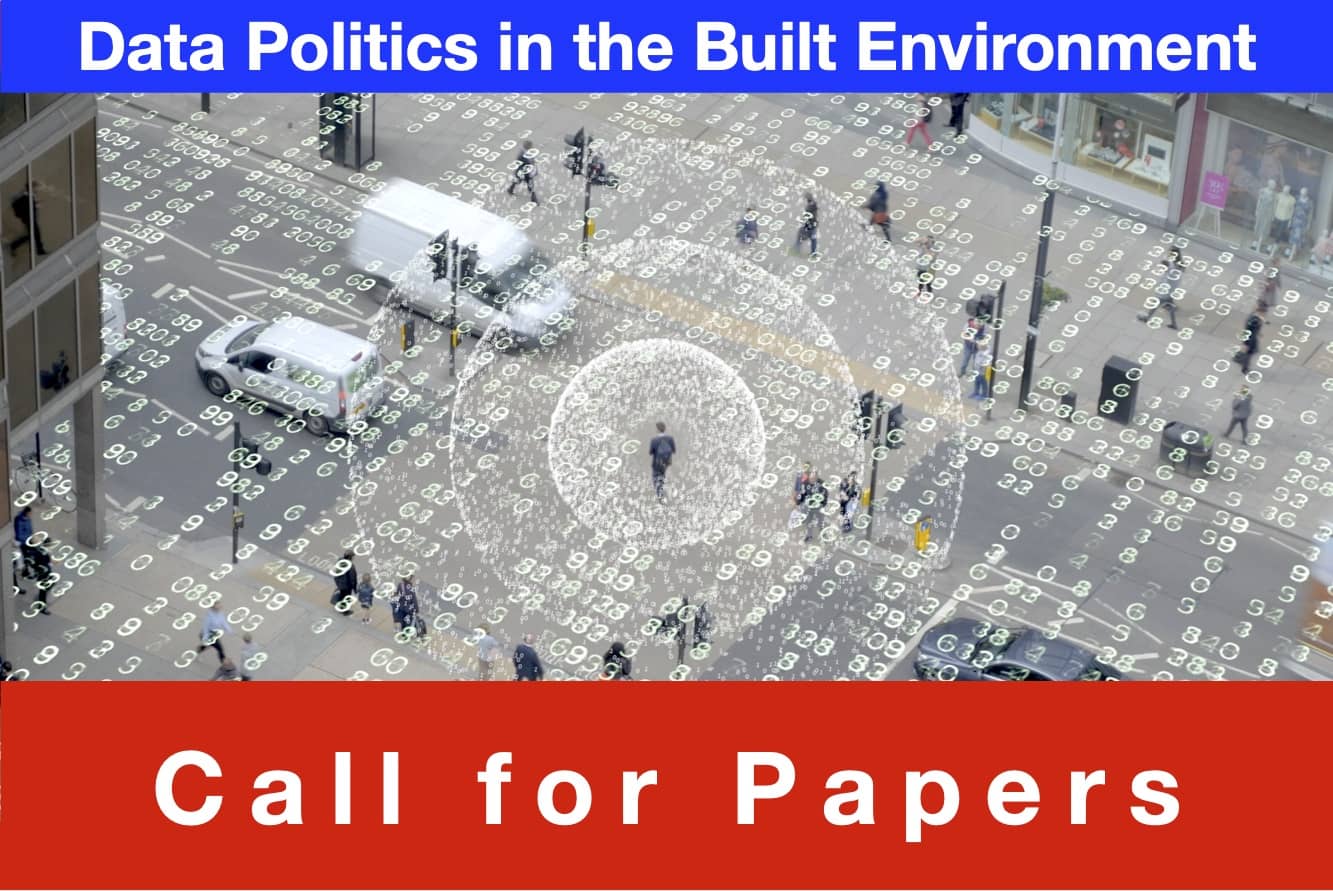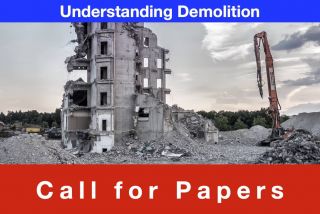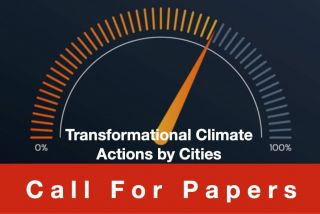
www.buildingsandcities.org/calls-for-papers/data-politics.html
Data Politics in the Built Environment

Guest Editors: Andrew Karvonen (Lund U) & Tom Hargreaves (U of East Anglia)
Abstract submissions closed on 26 September 2022
How are data reconfiguring life in buildings and cities? Who are the subjects and objects of data-driven buildings and cities? What are the implications of data-driven buildings and cities for social equity and justice? How do these powers and associated practices align with policies and regulation?
The aim of this special issue is to improve our collective understanding of the practices, politics, and power implications of data-driven buildings and cities. How is data generated, metabolised, and gathered in the built environment? Who designs and governs these data flows and to what end? Who and what is enrolled in the datafication of buildings and cities? What forms and types of data are collected and what gets ignored in data flows at and across different scales? What are the broader implications for social justice and equity? We invite social scientists, planners, designers, building scientists, data scientists, and environmental scientists to shine a critical spotlight on the motivations, methods, and consequences of data-driven buildings and cities.
Background
Buildings and cities are increasingly being reconfigured and reimagined by flows of data (e.g. Barns 2019, Hodson et al. 2020, Kitchin et al. 2017). Smart homes and connected buildings, electric scooter and bike sharing programmes, autonomous vehicles and Mobility as a Service programmes, surveillance and security systems, digitally-networked infrastructure services, and urban control centres are just a few of the many examples of how data cut across multiple scales to reconfigure buildings, neighbourhoods, cities, and regions in fundamental ways (e.g. Degen et al. 2022, Marvin et al. 2015, Luque-Ayala & Marvin 2020). This datafication of buildings and cities is intended to produce a seamless built environment that connects providers and users, facilitates information provision and financial transactions, and informs and improves decision making processes (e.g. Hodson et al. 2020).
There are growing concerns however that these processes of datafying the built environment are far from neutral and benign. Critics of data-driven environments argue that the collection, management, integration, analysis, and application of datasets produces specific lived conditions that are beneficial to some but not all (e.g. Bigo et al. 2020, Graham & Dittus 2022). This work has focussed on the unavoidably political processes involved in deciding what data gets collected (and what ignored) and how this generates particular and partial understandings that reflect and privilege some experiences of life in buildings and cities while neglecting others. For example, it has emphasised: how the presumed objectivity of data and the forms of algorithmic decision-making performed upon them can both mask and reinforce historic forms of prejudice, inequality and discrimination (e.g. Eubanks 2018); how data from 'smart' systems is used to surveil and control people in their homes, workplaces and local communities (e.g. Nicholls et al. 2020); how the opacity of data flows in cities serves to protect private interests whilst shutting out vital forms of public engagement (e.g. Sadowski 2020); and, more optimistically, how citizens and grassroots initiatives can both resist and innovate with and repurpose data flows to redistribute costs and benefits and generate more inclusive forms of smart urbanism. Taken together, these critiques not only raise important questions about social equity and justice in the datafication of the built environment, but also hold significant implications for how data flows in the built environment might be re-thought and re-made for more sustainable and inclusive ends.
List of suggested topics
We welcome theoretical and empirical abstracts that focus on the practices, politics and power implications of: smart homes, buildings and infrastructure networks, urban platforms and operating systems, e-governance and the digitalisation of public administration, city information modelling and digital twins, etc. The following questions provide some critical entry points for analysis and reflection:
- How are practices of algorithms, machine learning, artificial intelligence and calculative rationalities being applied to the built environment?
- Why are some types of data preferred over others in datafied buildings and cities and with what implications?
- How do data flows interact with and impact on everyday social interactions and dynamics in homes, workplaces and communities?
- How do the ontological and epistemological assumptions of data experts influence the knowledge differentials of urban development?
- Who gathers, cleans, analyses and applies data streams in cities and to what ends?
- How does the ownership of and access to data relate to consent, privacy, and security of urban residents?
- What types of surveillance landscapes are produced by data-driven agendas and what are the implications to privacy and control?
- How do data-driven agendas stretch, circumvent and contradict existing social dynamics, regulations, and policies?
- How are data flows implicated in the convergence of smart and sustainable urban development programmes and projects?
- In what ways are different publics engaged with and produced by data flows in the built environment?
- How are activists and civil society groups using data flows to support and extend their subaltern agendas?
- What are the implications for social equity and justice in datafied buildings and cities?
- Do data flows reconfigure the conventional scalar dynamics of buildings, neighbourhoods, cities, and regions?
- How are data flows creating new connections to transnational corporations and global knowledge networks?
Briefing note for contributors
You are invited to submit an abstract for this special issue. Please send a 500 word (maximum) abstract to editor Richard Lorch by 26 September 2022. Your submission must include these 3 items:
- the author's and all co-author's names, institutional and departmental affiliations, and contact details
- the question(s) in this Call for Papers that the abstract and intended paper address
- the abstract (300 - 500 words maximum) defining the research question(s), scope, methods and results.
Abstracts will be reviewed by the editors to ensure a varied, yet integrated selection of papers around the topic. Authors of accepted abstracts will be invited to submit a full paper (6000-7500 words), which undergoes a double-blind review process.
Buildings & Cities is an international, open access, double-blind peer-reviewed research journal. Its focus is the interactions between buildings, neighbourhoods and cities by understanding their supporting social, economic and environmental systems. More information including its Aims & Scope, Key Principles and Editorial Board can be found here: www.buildingsandcities.org & published papers are found here: https://journal-buildingscities.org
Open access / Article Processing Charge
Buildings & Cities is an open access journal and has an article processing charge (APC) of £1200. If you do not have institutional support, please notify the editor when submitting your abstract. B&C endeavours to assist those without funding.
Questions?
If you have a
question, please contact:
Richard Lorch
Andrew
Karvonen
or Tom Hargreaves
Timeline
|
Abstracts due |
26 Sept 2022 |
|
|
Workshop with selected authors |
Oct/Nov 2022 |
|
|
Full papers due |
01 February 2023 |
(NB: authors can submit
sooner if they wish) |
|
Referees' comments |
24 April 2023 |
|
|
Final version due |
22 May 2023 |
|
|
Second reviews (if needed) |
June 2023 |
|
|
Publication |
September 2023 |
(NB: papers are published as soon as they are accepted) |
Key readings
Barns, Sarah. (2019). Platform Urbanism: Negotiating Platform Ecosystems in Connected Cities. Springer Nature.
Bigo, D., Isin, E. & Ruppert, E. (2020). Data Politics: Worlds, Subjects, Rights. Taylor & Francis.
Degen, M.M. & Rose. G. (2022). The New Urban Aesthetic: Digital Experiences of Urban Change. Bloomsbury Publishing.
Eubanks, V. (2018). Automating Inequality: How High-tech Tools Profile, Police, and Punish the Poor. St. Martin's Press.
Graham, M. & Dittus, M. (2022). Geographies of Digital Exclusion: Data and Inequality. Pluto Press.
Hodson, M., Kasmire, J., McMeekin, A., Stehlin, J.G. & Ward, K. eds. (2020). Urban Platforms and the Future City: Transformations in Infrastructure, Governance, Knowledge and Everyday Life. Routledge.
Kitchin, R., Lauriault, T.P. & McArdle, G. (2017). Data and the City. Routledge.
Luque-Ayala, A. & Marvin, S. (2020). Urban Operating Systems: Producing the Computational City. MIT Press.
Marvin, S., Luque-Ayala, A. & McFarlane, C. eds. (2015). Smart Urbanism: Utopian Vision or False Dawn? Routledge.
Mattern, S. (2021). A City is Not a Computer: Other Urban Intelligences. Princeton University Press.
Nicholls, L., Strengers, Y. & Sadowski, J. (2020). Social impacts and control in the smart home. Nature Energy, 5.
Sadowski, J. (2020). Too Smart: How Digital Capitalism is Extracting Data, Controlling Our Lives, and Taking Over the World. MIT Press
Shapiro, A. (2020). Design, Control, Predict: Logistical Governance in the Smart City. University of Minnesota Press.
Latest Peer-Reviewed Journal Content
Acceptability of sufficiency consumption policies by Finnish households
E Nuorivaara & S Ahvenharju
Key factors for revitalising heritage buildings through adaptive reuse
É Savoie, J P Sapinski & A-M Laroche
Cooler streets for a cycleable city: assessing policy alignment
C Tang & J Bush
Understanding the embodied carbon credentials of modern methods of construction
R O'Hegarty, A McCarthy, J O'Hagan, T Thanapornpakornsin, S Raffoul & O Kinnane
The changing typology of urban apartment buildings in Aurinkolahti
S Meriläinen & A Tervo
Embodied climate impacts in urban development: a neighbourhood case study
S Sjökvist, N Francart, M Balouktsi & H Birgisdottir
Environmental effects of urban wind energy harvesting: a review
I Tsionas, M laguno-Munitxa & A Stephan
Office environment and employee differences by company health management certification
S Arata, M Sugiuchi, T Ikaga, Y Shiraishi, T Hayashi, S Ando & S Kawakubo
Spatiotemporal evaluation of embodied carbon in urban residential development
I Talvitie, A Amiri & S Junnila
Energy sufficiency in buildings and cities: current research, future directions [editorial]
M Sahakian, T Fawcett & S Darby
Sufficiency, consumption patterns and limits: a survey of French households
J Bouillet & C Grandclément
Health inequalities and indoor environments: research challenges and priorities [editorial]
M Ucci & A Mavrogianni
Operationalising energy sufficiency for low-carbon built environments in urbanising India
A B Lall & G Sethi
Promoting practices of sufficiency: reprogramming resource-intensive material arrangements
T H Christensen, L K Aagaard, A K Juvik, C Samson & K Gram-Hanssen
Culture change in the UK construction industry: an anthropological perspective
I Tellam
Are people willing to share living space? Household preferences in Finland
E Ruokamo, E Kylkilahti, M Lettenmeier & A Toppinen
Towards urban LCA: examining densification alternatives for a residential neighbourhood
M Moisio, E Salmio, T Kaasalainen, S Huuhka, A Räsänen, J Lahdensivu, M Leppänen & P Kuula
A population-level framework to estimate unequal exposure to indoor heat and air pollution
R Cole, C H Simpson, L Ferguson, P Symonds, J Taylor, C Heaviside, P Murage, H L Macintyre, S Hajat, A Mavrogianni & M Davies
Finnish glazed balconies: residents' experience, wellbeing and use
L Jegard, R Castaño-Rosa, S Kilpeläinen & S Pelsmakers
Modelling Nigerian residential dwellings: bottom-up approach and scenario analysis
C C Nwagwu, S Akin & E G Hertwich
Mapping municipal land policies: applications of flexible zoning for densification
V Götze, J-D Gerber & M Jehling
Energy sufficiency and recognition justice: a study of household consumption
A Guilbert
Linking housing, socio-demographic, environmental and mental health data at scale
P Symonds, C H Simpson, G Petrou, L Ferguson, A Mavrogianni & M Davies
Measuring health inequities due to housing characteristics
K Govertsen & M Kane
Provide or prevent? Exploring sufficiency imaginaries within Danish systems of provision
L K Aagaard & T H Christensen
Imagining sufficiency through collective changes as satisfiers
O Moynat & M Sahakian
US urban land-use reform: a strategy for energy sufficiency
Z M Subin, J Lombardi, R Muralidharan, J Korn, J Malik, T Pullen, M Wei & T Hong
Mapping supply chains for energy retrofit
F Wade & Y Han
Operationalising building-related energy sufficiency measures in SMEs
I Fouiteh, J D Cabrera Santelices, A Susini & M K Patel
Promoting neighbourhood sharing: infrastructures of convenience and community
A Huber, H Heinrichs & M Jaeger-Erben
New insights into thermal comfort sufficiency in dwellings
G van Moeseke, D de Grave, A Anciaux, J Sobczak & G Wallenborn
'Rightsize': a housing design game for spatial and energy sufficiency
P Graham, P Nourian, E Warwick & M Gath-Morad
Implementing housing policies for a sufficient lifestyle
M Bagheri, L Roth, L Siebke, C Rohde & H-J Linke
The jobs of climate adaptation
T Denham, L Rickards & O Ajulo
Structural barriers to sufficiency: the contribution of research on elites
M Koch, K Emilsson, J Lee & H Johansson
Disrupting the imaginaries of urban action to deliver just adaptation [editorial]
V Castán-Broto, M Olazabal & G Ziervogel
Nature for resilience reconfigured: global- to-local translation of frames in Africa
K Rochell, H Bulkeley & H Runhaar
How hegemonic discourses of sustainability influence urban climate action
V Castán Broto, L Westman & P Huang
Fabric first: is it still the right approach?
N Eyre, T Fawcett, M Topouzi, G Killip, T Oreszczyn, K Jenkinson & J Rosenow
Social value of the built environment [editorial]
F Samuel & K Watson
Understanding demolition [editorial]
S Huuhka
Data politics in the built environment [editorial]
A Karvonen & T Hargreaves



Latest Commentaries
Decolonising Cities: The Role of Street Naming
During colonialisation, street names were drawn from historical and societal contexts of the colonisers. Street nomenclature deployed by colonial administrators has a role in legitimising historical narratives and decentring local languages, cultures and heritage. Buyana Kareem examines street renaming as an important element of decolonisation.
Integrating Nature into Cities
Increasing vegetation and green and blue spaces in cities can support both climate change mitigation and adaptation goals, while also enhancing biodiversity and ecological health. Maibritt Pedersen Zari (Auckland University of Technology) explains why nature-based solutions (NbS) must be a vital part of urban planning and design.